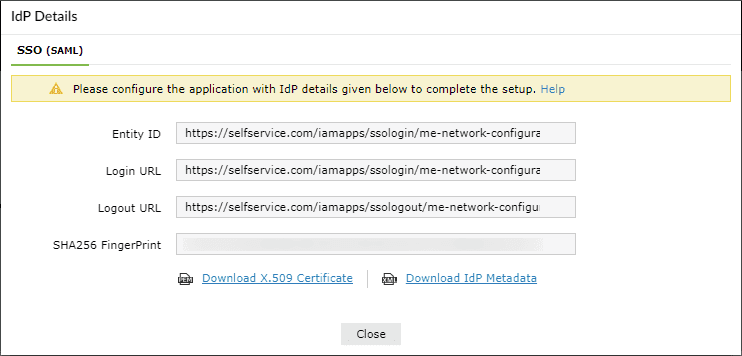Configuring SAML SSO for ManageEngine Network Configuration Manager
These steps will guide you through setting up the single sign-on (SSO) functionality between ADSelfService Plus and Network Configuration Manager.
Prerequisite
- Ensure that the ADSelfService Plus server can be accessed through HTTPS Connection (Access URL must be configured as HTTPS).
- Log in to ADSelfService Plus as an administrator.
- Navigate to Configuration → Self-Service → Password Sync/Single Sign On → Add Application, then select Network Configuration Manager from the applications displayed.
Note: You can also find the Network Configuration Manager application from the search bar located in the left pane or the alphabet-wise navigation option in the right pane.
- On the Network Configuration Manager page, click IdP details in the top-right corner of the screen.

- You can configure the identity provider (IDP) details by either uploading the metadata file or entering the details manually.
- Uploading metadata file: Click the Download IdP Metadata link to download the metadata file to be uploaded during the configuration of Network Configuration Manager.
- For manual configuration: In the pop-up that appears, copy the Login URL and Logout URL, then download the SSO certificate by clicking Download X.509 Certificate.

Network Configuration Manager (Service Provider) configuration steps
- Log in to Network Configuration Manager with an administrator's credentials.
- In the Network Configuration Manager portal,go to Settings > Authentication > SAML.

-
Within the Service Provider Details section copy the Entity ID and Assertion Consumer URL. These will be used in a later step.

- The IdP details can be entered in two ways: By using the Metadata file or by manually entering the IdP details.
A. Using the Metadata file
- Navigate to the Identity Provider Details section, then choose the Upload IdP metadata file radio button.
- Enter ADSelfService Plus as the IdP Name, then select Email ID from the Name ID Format drop-down.
- Upload the metadata file downloaded in step 5a of Prerequisite.
- Click Save.
- Click Test connection to test the connection.
- Click Enable SAML SSO.

B. Manually entering the IdP details
- Navigate to the Identity Provider Details section, then choose the Configure IDP information manually radio button.
- Enter "ADSelfService Plus" as the Name, then select Email ID from the Name ID Format drop-down.
- Paste the Login URL and Logout URL values copied in step 5b of Prerequisite in the IdP Login URL and IdP Logout URL fields, respectively.
Note: The Logout URL is optional and can be skipped if single logout (automatically log out from ADSelfService Plus when logging out from Network Configuration Manager) is not required.
- Upload the X.509 certificate file downloaded in step 5b of Prerequisite in the IDP's Certificate field.
- Click Save.
- Click Test connection to test the connection.
- Click Enable SAML SSO.

ADSelfService Plus (Identity Provider) configuration steps
- Now, switch to the ADSelfService Plus Network Configuration Manager configuration page.
- Enter the Application Name and Description.
- Enter the Domain name of your Network Configuration Manager account. For example, if you use johndoe@thinktodaytech.com to log in to Network Configuration Manager, then thinktodaytech.com is the domain name.
- In the Assign Policies field, select the policies for which SSO needs to be enabled.
Note: ADSelfService Plus allows you to create OU and group-based policies for your AD domains. To create a policy, go to Configuration > Self-Service > Policy Configuration > Add New Policy.
- Select the SAML tab and check Enable Single Sign-On.
- Paste the AssertionConsumerService Location copied in step 3 of Network Configuration Manager configuration steps in the Assertion Consumer URL field.
- Paste the EntityID copied in step 3 of Network Configuration Manager configuration steps in the Entity ID field.
- In the Name ID Format field, choose the format for the user login attribute value specific to the application.
Note: Use Unspecified as the default option if you are unsure about the format of the login attribute value used by the application.
- Click Add Application.

Your users should now be able to sign into Network Configuration Manager through the ADSelfService Plus portal.
Note: For Network Configuration Manager, both SP-initiated and IdP-initiated flows are supported.
Don't see what you're looking for?
-
Visit our community
Post your questions in the forum.
-
Request additional resources
Send us your requirements.
-
Need implementation assistance?
Try OnboardPro






